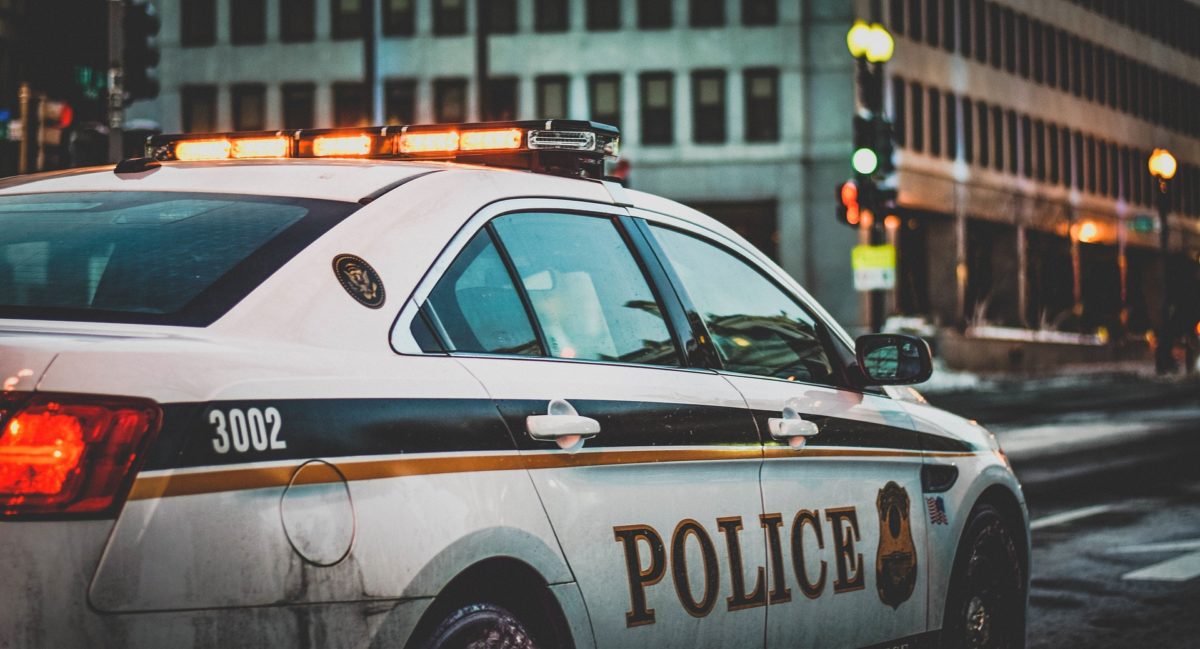New research shows that the popular The Fast and the Furious movie franchise may be encouraging motorists to speed. A New York Times report analyzed traffic violation data from Montgomery County in Maryland from 2012 to 2017. The researchers found a large increase in the average speed of drivers who received speeding tickets on the weekends after new Fast and the Furious movies were released. Continue reading “Report: ‘Fast and Furious’ Movies Cause Increase in Speeding Tickets”
Author: RLF Attorneys
Can Police Issue Speeding Tickets Outside Their Jurisdiction?

Orange County PD flash their lights at you just a few traffic signals away from the border of Putnam County. Do you pull over or gun it so that cops can’t chase you over county lines? It sounds tempting to try to get away, but would it work? Can police chase you and issue a speeding ticket outside their jurisdiction?
Continue reading “Can Police Issue Speeding Tickets Outside Their Jurisdiction?”
How to Avoid Speeding This Holiday

Don’t Let Sun Glare Ruin Your Holiday Travel

Continue reading “Don’t Let Sun Glare Ruin Your Holiday Travel”
How to Get a Warning Instead of a Ticket
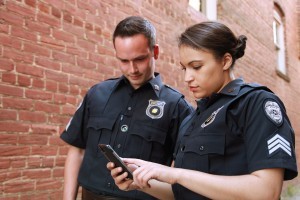
Let’s start with the opposite: when an officer is allowed to issue a ticket? A cop must have an objective, clearly articulable violation of an ordinance or statute which prompts the traffic stop. This is referred to as “probable cause.” There are some exceptions to this, such as an investigative stop based on reasonable suspicion of a crime. If neither of the above are the case, the stop would be considered unlawful.
That said, if you have been pulled over it is usually reasonable to assume that the officer clearly witnessed a violation. When a driver isn’t cited, it is usually because the officer exercised discretion and decided not to. Law enforcement officials have surprisingly wide latitude in discretion — they can warn or ticket for a lot of reasons, including patently superficial ones. They can also choose to issue tickets for relatively trivial offenses, or issue a warning for serious ones.
The bottom line is that there isn’t necessarily a rhyme or reason behind the decision to ticket or not ticket. Does that mean that getting off with a warning is a matter of luck? Perhaps, but there are some things you can do to increase your chances, such as:
- Be polite. Remember that the officer is only doing his/her own job.
- Be calm. Don’t get frustrated or angry. At the same time, don’t gush or turn on the water works (this may work sometimes for women, but only in moderation).
- Be quiet. In other words, don’t offer any more information than you have to. Don’t admit to the infraction. If you do and the officer does issue a ticket, that admission can be used against you should you challenge to ticket in court.
- Be cooperative. Provide the legally required information and documents in a timely manner. Also, keep the music down and your hands on the wheel. In the daytime, take off your sunglasses. At night, turn on the interior car lights.
Realize that even if you do all of the above you may still get a ticket. If you or a loved one has been ticketed for speeding or any other traffic violation in New York or New Jersey, you need expert legal counsel right away. The lawyers of the Rosenblum Law Firm are skilled traffic ticket attorneys who are experienced in handling tickets for speeding as well as other driving-related offenses. Call 888-203-2619 or email the Rosenblum Law Firm today for a free consultation about your case.
The Fastest Speeding Ticket Ever
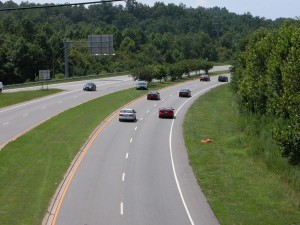
There is one caveat to all this – no public record of the incident exists. The story became widespread when it was mentioned on an episode of Top Gear (Season 8, Episode 1). No witnesses or evidence have ever turned up.
Given the possible fiction-status of this entry, we submit to you a follow up: a 205-mph ticket for a motorcycle rider in Minnesota. Here at least there is an article documenting the incident. It happened in 2004 on U.S. Highway 61 in Wabasha. The rider, then-20-year-old Samuel Armstrong Tilley, was arrested and charged with reckless driving and driving without a motorcycle license.
If you are caught going over 200 mph in New York you are likely to get hit with a speeding ticket of about $600, plus a mandatory NYS surcharge of up to $93. A conviction would result in 11 points on your license, which means an automatic suspension even if you have no other convictions on your driving record. Not to mention, at such a speed, it’s also possible to be charged with reckless driving, as happened to Tilley. That’s not even getting into the impact on your auto insurance.
If you or a loved one has been caught speeding – even if it doesn’t break any records – it is advisable that you consult an attorney right away. The lawyers of the Rosenblum Law Firm are skilled New York traffic ticket attorneys with experience handling tickets for speeding as well as other driving-related offenses. Call 888-203-2619 or email the Rosenblum Law Firm today for a free consultation about your case.
Difference Between Yellow vs White Speed Limit Signs
What’s the Difference Between Yellow and White Speed Limit Signs?
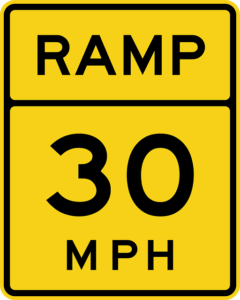
Speed limit signs seem like the simplest thing in the world. You may have noticed, however, that some speed limit signs are yellow, while most are white. Seems like a minor thing, but there’s a difference between them that you should be aware of.
Yellow speed limit signs are also known as advisory speed limit signs. You’ll see these most often when roads curve. You might also see them on a stretch of road that is hilly or which suddenly narrows. Either way, it is a warning to drivers to reduce speed.
The limit on an advisory speed limit sign is always at least 5 mph lower than the rest of the roadway. The yellow color is intended to draw your attention so that you adjust your speed accordingly. In most cases, the advisory limit is temporary; once you have passed the stretch of road with the advisory-inducing conditions, a white sign will typically be posted indicating you can return to the old speed. However, it is possible for multiple advisory limits to appear back to back.
Can I Get a Ticket for Exceeding an Advisory Limit?
Advisory speed limits are not a legal speed limit; only the standard white speed limit signs carry the force of the law. Therefore, you cannot get a speeding ticket for disobeying an advisory speed limit sign. Yellow signs are simply a warning to drivers of a change in road conditions that may make their current speed dangerous. The number is usually based on the physics of the road, taking into account things like centrifugal force (around a bend) and angular momentum (at the top of a hill).
If an officer issues a speeding ticket, it is most likely for exceeding the official (white) speed limit. This will cost at least $150 plus a mandatory surcharge of $88-$93 and will lead to no less three points but as many as 11 points on your New York license, depending on how far above the standard limit you were going. Alternatively, there’s a chance you could get hit with a ticket for failure to reduce speed. This rarely-issued ticket penalizes drivers who do not slow down for special hazards, such as when approaching train tracks or the crest of a hill. It carries a maximum fine of $150 plus a mandatory surcharge of $88-$93 and three points on your license.
While exceeding an advisory speed is not illegal per se, it can be considered negligent. That means if you are involved in an accident while exceeding the advisory limit, you can be liable.
In addition to the fines and points, a conviction for any kind of speeding ticket can cause your auto insurance rates to skyrocket. If you or a loved one has been caught speeding, it is advisable that you consult an attorney to help you avoid the costs and points associated with a ticket. The lawyers of the Rosenblum Law Firm are skilled New York traffic ticket attorneys who are experienced in handling tickets for speeding as well as other driving-related offenses. Call 888-203-2619 or email the Rosenblum Law Firm today for a free consultation about your case.
When a Speeding Ticket Becomes a Civil Lawsuit
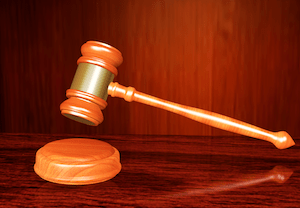
Once a guilty plea has been entered into the court system, that admission can be used against you in a civil lawsuit. That’s why other states such as California and Connecticut have the option of pleading nolo contendere, i.e. no contest. In essence, a plea of nolo contendere means you know you can’t prove your innocence, so you accept the consequences of the charges but do not admit guilt. As a result, the plea and the charges cannot be used as evidence in a civil suit since you never found guilty or admitted to committing the crime.
Unfortunately, New York does not allow defendants to plead no contest; you can either accept the charges or fight them in traffic court. It should be noted that being found guilty does not carry quite the same weight in civil court as pleading guilty. However, either one indicates a level of civil liability. If the odds of getting found not-guilty of one or more charges seem slim, the next best bet would be to hire an attorney to help negotiate the charges down to a non-moving violation. In addition to having less of an impact your auto insurance, a non-moving conviction can’t be used in an accident-related civil suit.
Drivers should also be cautious about verbally admitting to traffic violations, especially at the scene of an accident. Off-the-cuff statements such as “I was only going 5mph over the limit” or “I didn’t see her in my mirror” can be used against you in civil court (as well as in traffic court).
It is essential that you contact an attorney if you or someone you love has been given a speeding ticket or any other traffic violation in connection with an accident. The lawyers of the Rosenblum Law Firm are skilled traffic ticket attorneys with extensive experience fighting moving violations and negotiating with prosecutors. Email or call 888-203-2619 for a free consultation about your case.
How to Avoid a Speeding Double Whammy
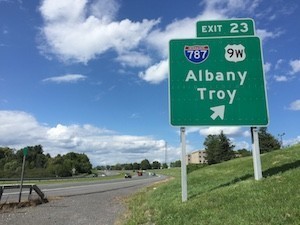
While the vast majority of New York roads have posted speed limits, the state also has an official maximum limit of 55 mph. Violating the 55-mph limit on a highway (or anywhere else) is actually classified as its own violation. Technically, this means that drivers who exceed 55 mph in New York have committed two violations – speeding and speeding above 55 mph. In that case, could a driver get two tickets?
It’s not common, but it can and does happen. On very rare occasions an officer will issue someone a ticket under VTL 1180-d (your default speeding ticket) and 1180-b (exceeding state limit). The good news is that if you do get two tickets for the same offense, there is a high chance you’ll be able to fight the charges.
Any time you receive two tickets for what is essentially a single violation, that is considered double jeopardy. Federal law makes it illegal for a person to be charged twice for the same crime or violation, and an attorney can help you submit a motion to dismiss the charges. The judge then has the discretion to dismiss either one or both of the tickets.
A ticket for either VTL 1180-d or 1180-b costs at least $150 plus an NYS surcharge of up to $93, and carries a minimum of three points on your license. A conviction can also wreak havoc on your auto insurance premiums. If you or a loved one has been ticketed for speeding, exceeding the state limit, imprudent speed, or any other traffic violation in New York, contact a lawyer right away to fight the charges. The lawyers of the Rosenblum Law Firm are skilled New York traffic ticket attorneys who are experienced in handling tickets for all types of speeding and other driving-related offenses. Call 888-203-2619 or email the Rosenblum Law Firm today for a free consultation about your case.
Study: Driving Commutes Are Faster on Streets with Protected Bike Lanes
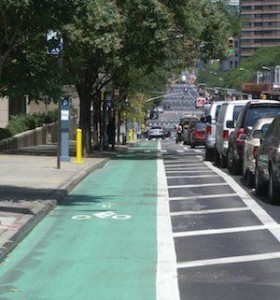
New York City drivers have always been reluctant to share space with bicyclists. For years, they worried that surrendering precious road space would lead to increased congestion and longer commutes. Well, worry no longer: A new study of the traffic patterns over the last seven years found the exact opposite to be true.
The NYC Department of Transportation unveiled a report that showed commute times for the 30 miles of roads that have protected bike lanes. On average, travel time has fallen by as much as 35 percent during rush hour, despite having one or sometimes two lanes taken from cars. For example, on Columbus Ave, it took cars an average of 4.38 minutes to travel from West 96 Street to West 77 Street between 7:00 am and 10:00 am before the new bike lanes were installed. Afterwards, the average travel time shrunk to just three minutes.
According to an analysis by Fast Company, the designated left-turning lanes are a big part of the reason for the improved speeds. Designed as a safety feature for cyclists, the lanes prevent cars from blocking an entire travel lane as they wait to turn.
Faster travel times is not an excuse for speeding on NYC streets. Tickets for speeding start at $150 and increase depending on how far over the posted limit you were going. Each ticket also an NYS surcharge of up to $93 and at least three points on your license. A conviction will likely increase your insurance premiums by hundreds of dollars as well. If you or a loved one has been caught speeding, it is imperative that you consult an attorney to help you avoid the consequences associated with a ticket. The lawyers of the Rosenblum Law Firm are skilled New York traffic ticket attorneys who are experienced in handling tickets for speeding as well as other driving-related offenses. Call 888-203-2619 or email the Rosenblum Law Firm today for a free consultation about your case.

